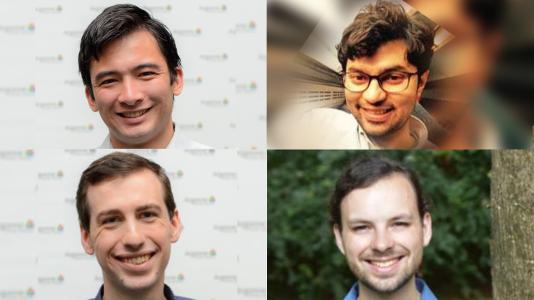
Particle accelerator technology is critical to a wide variety of socioeconomic and fundamental science applications. However, effective design of accelerator beamlines requires utilizing multiphysics codes including beam dynamics, magnets and RF cavities in order to account for competing design criteria, such as maximizing beam brightness and minimizing energy consumption. Tyler Chang is collaborating with a member from the High Energy Physics Division in developing a modular approach that loosely couples several multiphysics simulation modules within a design framework powered by optimization tools such as ParMOO and libEnsemble. This work will enable accelerator physicists to easily study future accelerator designs.
Removal of atmospheric carbon dioxide is a critical part of our nation’s goal of net-zero greenhouse gas emissions by mid-century. Akash Dhruv is developing a numerical framework to model chemical separation of CO2 at solid-fluid interfaces for industrial-scale computational fluid dynamics simulation of direct air capture (DAC). Dhruv will apply this framework to characterize the effects of ambient air flow, turbulence, heat transfer and design of solid adsorbent surfaces on the performance and efficiency of DAC processes. His research will be complementary to existing research in DAC that focuses on synthesis of adsorbent materials; he will add the component for process design.
David Lenz will use innovative techniques for natural language processing to improve gamma-ray spectroscopy. In gamma-ray spectroscopy, the underlying structure of atomic nuclei is inferred from the patterns of gamma rays emitted during the decay of excited nuclear levels. The format of this gamma ray data is strikingly like the data used to train natural language models, which power everything from voice assistants to sentiment analysis of social media posts. By leveraging the success of these natural language methods, Lenz and a collaborator from the Physics Division aim to increase the detection of subtle patterns in spectroscopic data.
Robert Underwood will apply his expertise in data compression and optimization to problems in high-resolution tomography. Improvements in sensor resolution and data acquisition rates have raised issues regarding moving and storing large datasets. While data compression has been applied to areas such as serial crystallography and ptychography, tomography has different data structures and compression requirements. Robert Underwood will collaborate with the X-ray Science division to create, evaluate and optimize a lossy compression workflow to accelerate streaming and reduce storage needs for 3D and 4D tomography studies.
The LDRD Seed Awards are made to the laboratory’s postdoctoral and early career researchers to encourage them to pursue new (and perhaps high-risk, high return) approaches to complex problems.